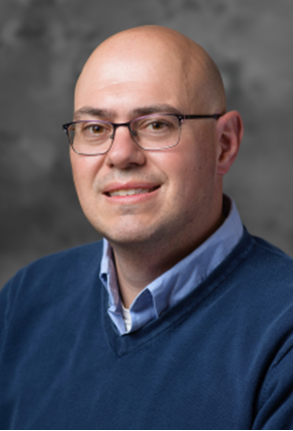Stephen LindemannAssociate ProfessorDepartment of Food Science Courtesy Appointment, Department of Biological Sciences 765-494-9207 NLSN3215 lindemann@purdue.edu |

|
PROFESSIONAL FACULTY RESEARCH
Dr. Lindemann leads the Diet-Microbiome Interactions Laboratory, which studies the underlying ecological principles by which microbial communities consume complex substrates (i.e. polysaccharides). Specifically, the D-MIL seeks to uncover how distinct dietary fibers shape gut microbiome community structure and metabolism, identify mechanisms by which gut microbiota influence human metabolism and inflammation, elucidate ecological principles governing microbial interactions in competition for oligosaccharides and polysaccharides, and identify control points by fiber structures can be used to shape microbiota towards health. In addition, the laboratory also aims to examine division of microbial labor in consumption of polysaccharides in the gut and the environment.
BIO
Current Graduate Students and Research Lab Members
Miguel Alvarez Gonzalez
Felicia Sackey
Selected Publications
Tuncil, Y., Chen, M., Yao, T., & Lindemann, S. R. (2018). Polysaccharide chemical structure controls on fermentation by gut microbiota, metabolic outputs, and interspecies interactions. In Proceedings of the American Chemical Society Annual Meeting . 255 . American Chemical Society.
Lindemann, S. R. (2019). Microbial Ecology: Functional “Modules” Drive Assembly of PolysaccharideDegrading Marine Microbial Communities. Current Biology, 29 (9), pp. R330-332.
Song, H. S., Renslow, R. S., Fredrickson, J. K., & Lindemann, S. R. (2015). Integrating ecological and engineering concepts of resilience in microbial communities. Front. Microbiol., 6 , p. 1298.
Nelson, W. C., Maezato, Y., Wu, Y. W., Romine, M. F., & Lindemann, S. R. (2016). Metagenomic sequencing of parallel consortia enables genome reconstruction of rare and closely-related organisms. AEM, 82 (1), pp. 255-267.
Renslow, R. S., Lindemann, S. R., & Song, H. S. (2016). A generalized spatial measure for resilience of microbial systems. Front. Microbiol., 7 , p. 443.
Cole, J. K., Morton, B. R., Cardamone, H. C., Lake, H. R., Dohnalkova, A. C., Kim, Y. M., ... Lindemann, S. R. (2018). Saliniramus fredricksonii gen. nov., sp. nov., a heterotrophic halophile isolated from Hot Lake, Washington, a member of a novel lineage (Salinarimonadaceae fam. nov.) within the order Rhizobiales, and reclassification of the genus Salinarimonas Liu et al. 2010 into Salinarimonadaceae. International Journal of Systematic and Evolutionary Microbiology, 68 (6), pp. 2116-2123.
Rosnow, J. R., Nandhikonda, P., Killinger, B., Nair, R., Anderson, L., Kim, Y. M., ... Wright, A. (2018). Elucidating the mechanistic underpinnings of a cobalamin activitybased probe in microbial cell growth, gene regulation, and enzyme activity. Applied and Environmental Microbiology, 84 , p. 18.
Biruete, A. K., Gallant, H., Lindemann, S. R., Wiese, G., Chen, N., & Moe, S. (2019). Phosphate binders and non-phosphate effects in the gastrointestinal tract. Journal of Renal Nutrition .
Intellectual Property
Lindemann, S. R., & Wright, A. T. Chromatin Activity Precipitation Method and System. Patent Coopoeration Treaty 10,731,202, and approvedAugust 4, 2020.
Beliaev, A. S., McClure, R. S., Bernstein, H., Lindemann, S. R., & Jansson, C. G. Microbial consortia for programmable output via photoautotroph-heterotroph interactions. Patent Coopoeration Treaty 10125348, and approvedNovember 13, 2018.
- People
- Faculty
- Staff
- Postdoctoral
- Emeritus